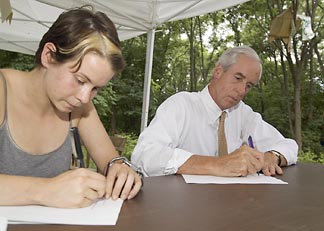Cornell reaches parking lot agreement

Cornell University and the Redbud Woods protesters have reached an agreement on building the replacement parking lot on West Campus. The university will assume additional responsibilities as a result of this agreement and is satisfied that the resolution of this situation is a positive development for all concerned.
The agreement is as follows:
Agreement regarding
the WCRI Replacement Parking Lot
July 18, 2005
Whereas the Cornell University administration and those who have opposed the parking lot on University Avenue agree that environmental sustainability is an important value, the University Administration agrees to the items below, provided that the protesters agree to leave the construction site of their own volition by Monday, July 18, 2005 and agree to the following conditions: that the construction of the parking lot commences without incident and proceeds without interruption by the protesters and that no vandalism by the protesters occurs on the site while construction is underway.
1) Cornell University will provide all new students (freshmen, transfers, professional and graduate students) who do not request/receive parking permits a free transit pass beginning in the fall 2005. This commitment will remain in place while the GEIS study is underway (thus suggesting that in the fall 2006, both the new students of that year and the second year students who enrolled in 2005 will be included.) As part of this GEIS, the issue of providing free passes for all students who do not request/receive parking permits will be examined thoroughly.
2) The Cornell Administration will ask the Student Assembly and the Graduate and Professional Student Assembly to conduct a non-binding referendum during the academic year 2005-2006 to assess student attitudes toward issues of parking and transportation, including but not limited to, a potential ban on cars for freshmen (or freshmen and sophomores); use of an incentive-driven parking plan to limit demand; appropriate amounts to charge students for parking. If the Assemblies are not interested in conducting such referenda, the Administration will conduct a survey on its own.
3) Cornell University administrators agree to meet regularly with a Cornell Neighborhood Council, modeled after the Collegetown Neighborhood Council, to discuss issues of shared interest. The proposed council should convene six times a year, starting by the end of the calendar year 2005.
- Representatives from the neighborhoods adjacent to the campus will be selected by the communities themselves.
- The proposed council will provide reports, from time to time, to the Cornell Administration which in turn will share such reports with the Community Communications Committee of the Board of Trustees.
4) The Executive Vice President will hire an environmental sustainability intern (at the same level as 2004-2005) to continue to provide focus and attention in this area while a more comprehensive plan is being developed. At that time, a decision regarding appropriate levels of staffing will be made.
- The Cornell Administration will work with members of the community to hold an environmental sustainability summit each semester.
- The Cornell Administration will issue a report by May 2006, and each year thereafter, cataloguing the progress made in the area of environmental sustainability. Projects accomplished, efforts underway and problem areas will be included in said report.
5) The President and Dean of the Faculty will form a faculty committee to serve in an advisory role to the University as it studies the balance between environmental sustainability and parking needs. Among the items for the committee to consider are forward-thinking steps to abate parking demand and/or to find sites that are appropriate for future parking lots. In addition, the committee will review the issues that led to the opposition to the University Avenue parking lot. Two members of the committee will be selected from among those faculty members opposed to the University Avenue parking lot; a student will also be included on the committee. The President and Dean will charge the committee by September 2005; the committee will deliver its final report by May 2006.
6) The Cornell Administration will ask the University Assembly to invite members of the senior administration to attend a UA meeting at least six times a year for an open question and answer period (similar to what is now a standing part of each Student Assembly meeting.)
7) In the master planning process, Cornell University expects to solicit views from Cornell community members, the Cornell Neighborhood Council and appropriate city officials.
8) With the signing of this agreement on Monday, July 18, 2005:
- The administration will speak with appropriate authorities about the charges pending related to the incidents of the sit-in in 300 Day Hall in April 2005 and their disposition.
- The administration will speak with the judicial administrator and recommend that if students accept, in writing, responsibility for their violation of the campus code an investigation and hearing may not be necessary.
- The violations cited on July 15, 2005 through July 18, 2005 will be forgiven.
Media Contact
Get Cornell news delivered right to your inbox.
Subscribe